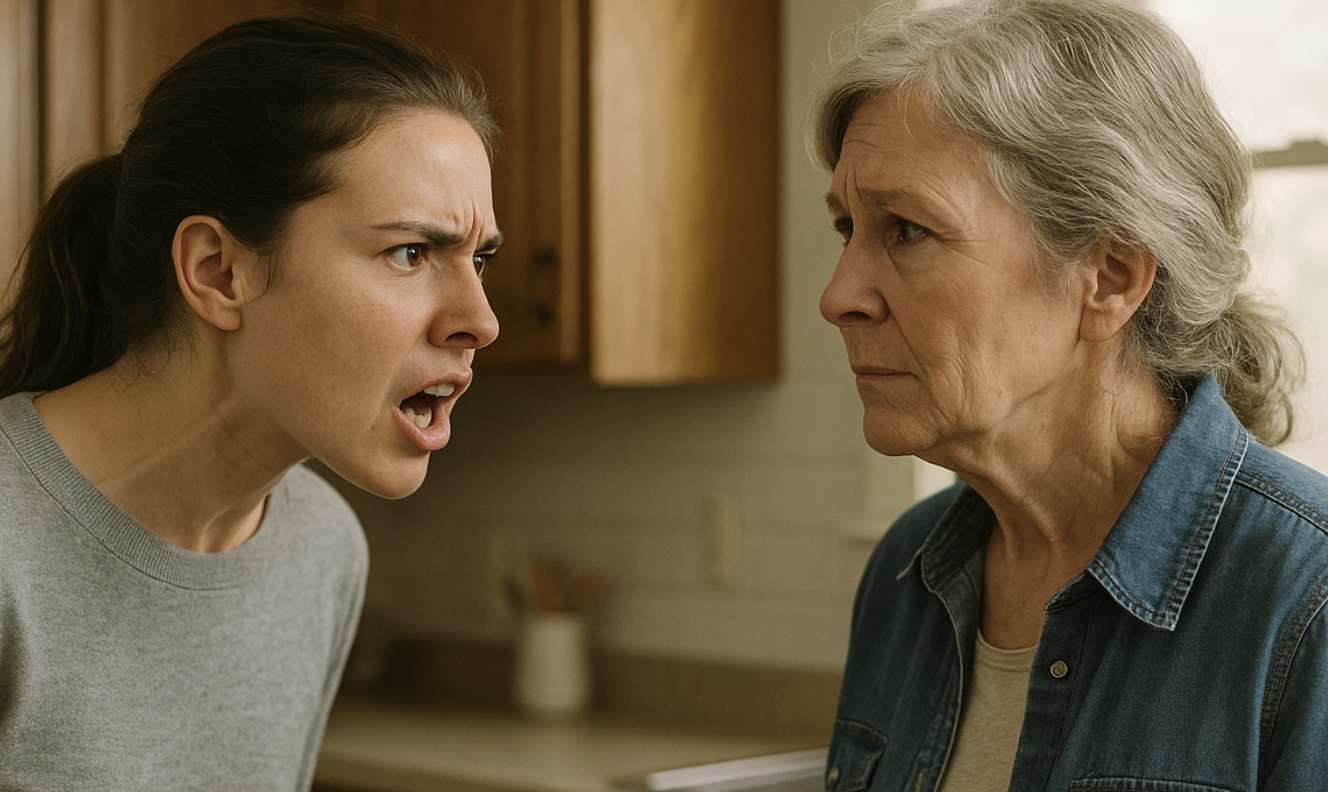— Dimochka, my son, it’s me… — the voice on the phone was weak, cracked, laden with universal grief.
Dima, sitting at the kitchen table scrolling through mortgage offers on his laptop, tensed up. He shot a quick, almost guilty glance at his wife. Sveta stood at the stove with her back to him. She didn’t turn around, but her back suddenly became perfectly straight, and the knife she was using to chop vegetables for the stew began to rap against the cutting board noticeably faster and harder. They both knew that voice. That voice always meant one thing — that a few large bills were about to be pulled from their family budget, which they stitched together with such effort from two salaries.
— Hi, Mom. What happened? You sound… — Dima tried to sound cheerful, but it didn’t come out well.
— What could happen, son, same as always. My blood pressure shot up again, my head is spinning, my eyes are going dark. The doctor prescribed new pills, and they cost as if they were made of gold. I looked at the prices and felt even worse. Here I am, finishing my last potato, and there’s nothing else. I don’t know how I’ll make it to my pension… — Tamara Semyonovna paused with the mastery of a seasoned actress, a pause full of suffering silence.
The clatter of the knife stopped. Sveta turned her head and looked straight at her husband. There was no pleading or reproach in her gaze. There was a cold, concentrated anger and a question she didn’t say out loud: “Are you going to fall for this again?”
Dima looked away. He couldn’t meet his wife’s eyes. Guilt toward his mother and shame before Sveta were tearing him apart.
— Mom, don’t say things like that. You know we’ll always help. I’ll transfer you some money right now; you can buy what you need.
— Oh, sonny, that’s so awkward… You’re young yourselves, you need it more… — lamented Tamara Semyonovna, but the notes of relief and triumph were already clearly audible in her voice.
— It’s not awkward. That’s it, Mom, wait for it, — Dima said curtly and hung up.
He didn’t raise his head right away. He sat staring at the dark phone screen as if gathering strength. Sveta set the knife down on the countertop. The light metallic click in the ensuing silence sounded like a gunshot. — Again? Dima, again? Her attacks are nothing if not punctual. Exactly one week after our payday. You could set your watch by them.
— Sveta, stop it, — he said wearily. — She’s my mother. She’s alone. Who else is she supposed to call if not me?
— Calling and asking is one thing. Putting on that performance with the last potato is another, — Sveta came to the table and sat across from him. — We’re saving for a down payment. We’re skipping vacations, new clothes, everything. Every kopeck counts. And your mother knocks us back a month with one phone call. Ten thousand last time, fifteen the month before that. For “medicine” no one has ever seen.
— She’s an elderly person! She really could have health problems! — Dima was already starting to get angry because he felt he was in the wrong.
— Elderly doesn’t mean truthful. I don’t believe a word she says, Dima. And deep down, neither do you. You just don’t want to admit it to yourself, because it’s easier to send her money and buy yourself two weeks of peace. Only you’re buying it at the expense of our future.
He said nothing. He silently picked up his phone, turned away from her, opened the banking app. His fingers flew over the screen. Sveta watched his hunched back, the way he concentrated on entering the amount, and felt something snap inside her. This wasn’t just another quarrel. It was a betrayal. Quiet, mundane, carried out with a couple of taps on a smartphone.
A notification flashed on Dima’s phone: “Transfer completed.” He set the phone on the table and, still not looking at his wife, stood up.
— I’m going for a walk.
He left, leaving her alone in the kitchen. The air wasn’t heavy — it had become rarefied, empty, as if not only the oxygen had been pumped out of it, but also all the unspoken words, trust, and intimacy. Sveta remained at the table, looking at the laptop he’d forgotten, with the mortgage calculator page still open. The numbers on the screen seemed like mockery. She realized arguing was useless. Words no longer worked. What was needed were facts. Ironclad, indisputable proof she could throw in his face. And she would find it. No matter what.
Evening brought no peace. It brought a thick, viscous silence that filled the entire apartment. Dima returned an hour later; without looking at Sveta, he went to the room and buried himself in the TV. They ate dinner in silence. They moved around the apartment like two ghosts who had accidentally found themselves in the same space, carefully avoiding each other’s eyes. Sveta could feel a glass wall growing between them — cold and transparent, but absolutely impenetrable. There was no point in arguing anymore. He had made his choice. Now she had to make hers.
After dinner, having cleared the dishes, she sat on the couch with her phone. Not to text or call anyone. She just needed to occupy her hands and eyes, to drown out unpleasant thoughts in the endless, meaningless feed of other people’s lives. Photos from children’s parties flashed by, proud posts about buying a new car, pictures of food from trendy restaurants. It all seemed distant and unreal. She scrolled mindlessly until she came across Vika’s bright avatar, Dima’s niece. The caption read: “Finally the sea! Turkey, we missed you!”
Sveta opened the photo album mechanically. First photo: Vika in a swimsuit against the azure sea. Second: a view from the hotel balcony of the pool. Third: a table laden with plates from the all-inclusive. Fourth: Vika with friends, all laughing and holding tall glasses of colorful cocktails. Sveta was about to scroll on when something caught her eye. In the background, at a table by the very edge of the pool, sat a group of older women. One of them, in a bright, flowery sundress, had thrown her head back and was laughing so contagiously it seemed you could hear it through the photo.
Sveta’s finger froze over the screen. Slowly, she pinched to zoom. The quality was excellent. The woman’s face drew close, became sharp, down to the tiniest crow’s-feet at her eyes. There was no doubt. It was Tamara Semyonovna. Her “poor, sick” mother-in-law. Tanned. Rested. Holding a glass with an orange drink garnished with a slice of orange. She did not look sick. She looked absolutely, dazzlingly happy.
A cold shard, sharp and clear as ice, pierced Sveta under the ribs. She scrolled on. Here was Tamara Semyonovna posing arm in arm with Vika against a sunset. And here she was, prancing along the beach. The lie was so brazen, so all-encompassing, it took her breath away. All those months of complaints, all those “last potatoes” and “expensive medicines” — all of it had paid for this very vacation, this laughter and these cocktails. Paid from their pockets. From their unborn mortgage.
At that very moment, Dima’s phone rang in the room. He flinched, tearing himself away from the TV. Sveta glanced at the screen of his phone lying on the coffee table. One word glowed on it: “Mom.”
Dima grabbed the phone.
— Hello, Mom? Did something else happen? In the receiver came sounds like stifled sobbing. Sveta saw her husband’s face tense and blanch. — What? You fell? Mom, calm down, explain properly!
Sveta stood up from the couch. She didn’t take her eyes off her husband, who had already leapt to his feet and was pacing the room.
— What operation? Urgent?.. My God, how much is it?! — his voice quivered with panic.
On the other end of the line, Tamara Semyonovna was clearly playing the role of her life. But Sveta no longer heard her lamentations. All she could see was her laughing, tanned face against a Turkish pool.
She walked up to Dima. He was so absorbed in the conversation he didn’t even notice her. She didn’t snatch the phone. She simply reached out and took it from his loosened hand. Dima stared at her in shock, speechless. Sveta brought the receiver to her ear. The mother-in-law’s sobbing stopped at once.
— Tamara Semyonovna? — Sveta’s voice was calm and even. Frighteningly calm. — Don’t worry. The money will come. I’ll bring it myself.
Sveta didn’t go to the bank. She didn’t even go to their usual neighborhood supermarket. Her car steered past the bright signs of familiar stores and turned toward the outskirts of the district, to a squat building of gray brick with a single sign over the entrance: “Groceries.” It was the lowest-rung discounter, a place people come to not for choice, but for survival. Inside, it smelled of damp cardboard and cheap plastic. Dim fluorescent lamps hummed under the ceiling, casting a merciless light on the aisles.
She didn’t take a cart. A large woven basket was enough. Sveta moved through the store with cold, surgical precision. Her gaze slid past bright packaging, past anything that might bring even the slightest culinary pleasure. She was looking for something else. She was looking for the essence. The essence of poverty, which her mother-in-law loved to describe.
There they were — pasta. Not from durum wheat in pretty bags with Italian flags, but grayish, brittle elbows in a simple transparent pouch with a crooked label. She took the largest bag, two kilos or so. Next — grains. Not premium rice or buckwheat, but the cheapest pearl barley, with dark specks visible through the cloudy cellophane. The bag thumped dully against the pasta in her basket. And finally, in the bread section, she found what she wanted. Rock-hard, stale rusks packed in the same faceless bags. Perfect fuel for survival. Nothing else. No oil, no sugar, no tea. Only the basics.
Having paid at the register with a crumpled bill and receiving change in small coins, she put her purchases into one large sack and went outside. After the stifling air of the store, the street felt fresh and clean. She felt neither anger nor satisfaction. Only a cold, ringing sense of righteousness.
The door of Tamara Semyonovna’s apartment didn’t open right away. First came the shuffle of slippers, then the long click of a lock. The mother-in-law stood on the threshold, leaning on the doorjamb. She wore an old robe, her hair was disheveled, and her hand lay theatrically on her forehead. She was playing the martyr just torn from her deathbed.
— Svetochka… Come in… I barely got up, — she whispered, peering behind Sveta’s back, obviously looking for the coveted envelope or bag of cash.
Sveta stepped inside without a word. She didn’t take off her shoes. She walked straight to the heart of the home — the kitchen. Tamara Semyonovna, surprised by such a breach of ritual, hobbled after her. Her “bad” leg seemed to bother her far less than the contents of the bag in her daughter-in-law’s hands.
The kitchen was clean and cozy. Much cozier than one would expect from the home of a “destitute” pensioner. Sveta went to the large dining table covered with a fresh daisy-patterned oilcloth. Tamara stopped in the doorway, her eyes fixed on the bag. Expectation mixed with poorly concealed impatience.
And then Sveta did it. She didn’t take anything out. She simply flipped the bag over, and with a sharp, dry rustle, dumped all of its contents right onto the table. The gray pasta scattered across the oilcloth with a cheap plastic clatter, the dusty bag of pearl barley landed beside it, and on top of this dreary still life the rock-hard rusks fell with a brittle crackle.
Tamara froze. Her hand, which had just been pressed to her forehead, dropped limply to her side. The martyr’s mask slid from her face, revealing bafflement turning into anger. She looked from the scattered groceries to Sveta’s impenetrable face.
— What… is this? — she hissed.
Sveta folded her arms across her chest. Her voice was even and distinct, each word dropping onto the table like another rusk.
— If you’re as poor and miserable as you say, then live on rusks and water. You won’t get any more money from us.
The silence changed. It stopped being sympathetic. It became accusatory. Tamara’s face turned crimson.
— You… How dare you?! — she took a step toward the table; her theatrical limp vanished without a trace. — I’ll tell my son! He’ll put you in your place!
— It’s the only thing you deserve after years of draining money from our family. You’ll get nothing else, — Sveta repeated just as calmly.
Realizing the play was over and that her daughter-in-law was unmoved, the mother-in-law began to flail. Her face contorted.
— I… It’s not what you think! I needed the money… for something else! For a friend! She was dying! And the vacation… Vika invited me, her package was nonrefundable! I didn’t pay for it!
She lied desperately and clumsily, tangling in her words like in a web. Sveta looked at her in silence, not dignifying the lies with so much as a nod. And that silence was scarier than any scolding. Unable to stand it, Tamara darted to the phone lying on the windowsill. Her fingers tapped frantically at the buttons.
— Son, your wife… she came here and… humiliated me! She dumped some slop on the table like I’m a dog! — Tamara’s voice rang with righteous fury, jumping into a shrill register. She spoke quickly, choking on words, constructing a picture of monstrous cruelty by her daughter-in-law. — She’s accusing me, says I’m lying! Do you hear me, Dima?! She’s mocking your sick mother!
Sveta didn’t move. She took her own phone from her jeans pocket. Her fingers moved over the screen quickly and precisely, without the slightest hesitation. Open the gallery. Select the needed files. The photo of her mother-in-law laughing by the pool. The photo with her niece, arms around each other at sunset. And the cherry on top — a short ten-second video she’d managed to download from Vika’s page, where Tamara, full of strength and energy, was dancing to a simple Turkish hit at a beach disco. She chose the contact “Husband” and pressed “Send.” The blue checkmark confirming delivery lit up almost instantly.
It all took no more than fifteen seconds. All this time, Tamara continued her angry tirade, noticing nothing around her.
— …you have to come and put her in her place! I demand that she apologize! I won’t let this stand! Dimochka, do you hear me? Hello!
On the other end of the line there was complete silence for a few seconds. Not the kind when the connection drops, but the kind that follows a blow. A dull, stunned silence. Then Sveta heard her husband’s voice. But it wasn’t Dima. Not the Dima who half an hour ago had panicked over an “operation” and felt guilty. The voice was level, metallic, devoid of any intonation. It was someone else.
— Mom. I saw the photos.
Just three words. But they hit Tamara harder than if her son had yelled at her. She froze with her mouth open. The flush of anger drained from her face, leaving an unhealthy pallor.
— What… what photos? — she stammered; her confidence began to crumble like old plaster. — It’s her! She sent you something! It’s Photoshop! Slander!
— And the video is Photoshop too? — Dima’s voice grew even harder and colder. — The one where you’re dancing on the beach? Must be part of rehab after the fall?
Tamara opened and closed her mouth like a fish thrown onto shore. She had run out of arguments. The script was in ruins. She tried to revert to her tried-and-true tactic; her voice trembled again, but this time from real panic, not fake suffering.
— Son, it’s not like that… I can explain everything…
— Don’t. There’s nothing to explain, — Dima cut her off. There was neither pity nor anger in his voice. Only emptiness and finality. — You lied to us. For years. You bled us for money while we counted every kopeck. You played on my feelings. That was the last time.
— Dima! Don’t you dare talk to me like that!..
But in reply she heard only short, indifferent beeps. He had hung up.
Tamara slowly lowered the hand holding the phone. She looked at Sveta, but her gaze was empty. There was no anger or cunning left in it. Only a dull, animal disbelief at what had happened. She had lost. Lost everything.
And Sveta just looked at her. Not a word of reproach. Not a shadow of triumph on her face. She simply watched as this woman’s world collapsed. Then, calmly and without haste, she turned around. Walked down the hall to the front door. The lock clicked. The door opened and closed. No slam, no sharp movement. Simple and final.
Tamara was left alone. In the middle of her clean, well-kept kitchen. On the table before her, on the bright daisy oilcloth, lay a forlorn handful of gray pasta and rusks — a monument to her own lies. In her hand she still clutched the phone. A useless piece of plastic that her son would never answer again. Outside, the city hummed, life went on, but in this little apartment it had just ended. Absolute, irrevocable silence fell…



